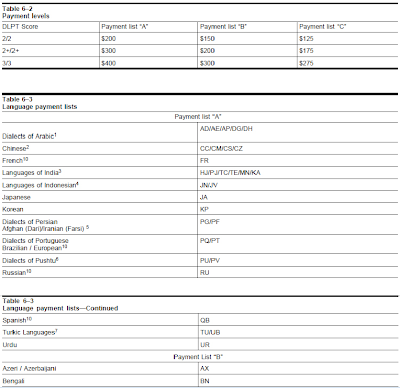In fiscal year 2011, the National Intelligence Program (NIP) made payments to 7,507 government employees within the CIA, DIA, FBI, NGA and NSA for foreign language proficiency (See the Washington Post's breakdown of the so-called "Black Budget"). This is not surprising given the Director of National Intelligence's emphasis on foreign language capability within the US national security intelligence community.
Among the top foreign languages are all the usual suspects - Spanish, Arabic, and Chinese -whereas less common languages populate the "special interest languages" list - Tagalog, Punjabi, Somali and Urdu.
 |
| Figure 1: Snippet of the US Army's Language Payment Incentives |
Similarly, the scores on the Department of Defense's DLPTs (Defense Language Proficiency Tests) can earn you pay incentives within government positions and the US Army for each of three language lists - A, B and C - ranked by importance (See Figure 1).
What does this mean for entry-level intelligence analysts?
It means that being bi- or multi-lingual is practically a pre-requisite for an intelligence analyst position.
Can't afford Rosetta Stone or other expensive programs? No time in a busy class schedule (or even busier work schedule) for a foreign language course?
Don't worry - You don't have to have a BA in Balkan Studies to pass a Serbo-Croatian language exam. There are plenty of (free!) online resources to help you achieve language proficiency levels all on your own.
Below are the top language learning resources on the web according to the blogosphere:
- DuoLingo. The absolute best thing about DuoLingo is that it is free! The only downside is that it currently only offers instruction in six languages, all of them European (and four of them romance languages). Of the free resources, DuoLingo's classes are arguably the most structured (and they also have an app!)
- LiveMocha. A DuoLingo rival is LiveMocha. Though the premium version is not free, the unpaid offering is significantly more robust than a standard trial version (and with 35 languages, their selection trumps that of DuoLingo). An alternative to paying for the premium upgrade is engaging in the LiveMocha social network and tutoring or offering rudimentary language instruction as a native speaker of your mother tongue in exchange for credit, which can then be applied to your language program of choice.
- OpenCulture, the cultural education blog, features a compendium of resources for language learning in 46 languages. The first suggestion in the majority of the language lists points you towards free iTunes podcasts and downloads for language learning, largely posted by the Radio Lingua Network (entitled Coffee Break) and The Peace Corps. (Also, see OpenCulture's full list of free online courses from top universities).
- Busuu. Busuu is of the same ilk as LiveMocha - It is interactive with a robust social media component, but also provides limited content with expanded content provided for premium members. LiveMocha, however, provides many more languages than Busuu's limited 12 language offering. Despite these limitations, it remains one of the more highly ranked language learning resources on the Internet.
- The US Department of State is also a good place to find language learning resources, though the Foreign Service Institute is likely for the more linguistically-inclined. The FSI posts all its language materials for 45 different languages online in an open source format including student text to audio recordings. Though the content is not aesthetically appealing and no instruction is provided, the resources are professionally-developed and highly useful, especially for those already fluent in the Linguistics vernacular.
- The Defense Language Institute/Foreign Language Center (DLI/FLC). DLI is one of the very best language schools in the world. In addition, it also provides a huge amount of its material for free. Need a language survival guide in Bulgarian? Try DLI. Need a quick series of lesson in Afghan handwriting? Try DLI. Need to know how to say "Goodbye!" in Balochi? You guessed it - DLI. There is a just an immense amount here and in a variety of hard-to-find foreign languages.
- Lang-8. Lang-8 is an interesting resource that provides a network of native speakers to correct foreign language writing submissions. It's pretty simple - You correct the submissions of others in your native language, and submit your writing to be corrected by others. Lang-8 boasts a network of native speakers from 180 different countries.
- RhinoSpike. RhinoSpike is a network similar to that of Lang-8 that facilitates the exchange of audio files alongside the text documents.
- iSketch. iSketch is my personal favorite. I used to play this all the time when I was learning Spanish! It is essentially an online form of Pictionary that can be played in English, French, Spanish and Portuguese with variations in languages such as Turkish and Swedish. It is easy, informal, extremely entertaining and useful for practicing foreign language vocabulary.
- italki. italki is an online community of Skype users aimed at language learning. Pay for individual Skype lessons, or arrange Skype lessons in your target language in exchange for giving lessons in your native language.
- Verbling. Verbling operates around much the same concept as italki, but is a bit more structured. You can sign up for an attend group lessons (the schedule for which is broadcasted on the home page) or you can pay for private tutoring sessions (the going rate is typically $25/hr).
Do you have a good resource for online language learning? Leave it in the comments!





